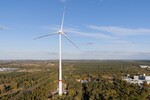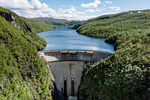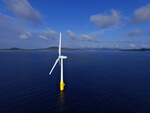04/28/2011
Iran - A land in nuclear controvercy with 15,000 MW of wind power possible
If wind turbines with a total power generating wind farm capacity of 500 megawatts are installed annually nationwide, Iran's wind power industry can compete at the international level and even enter target markets.
Arid areas of Iran have the potential to generate over 15,000 megawatts of wind power according to feasibility studies conducted recently. Hamid Chitchian noted that if wind turbines with a total power generating wind farm capacity of 500 megawatts are installed annually nationwide, Iran's wind power industry can compete at the international level and even enter target markets.
Based on plans drawn up by the Energy Ministry, wind turbines with a capacity to generate 1,650 megawatts of energy should be installed and become operational by March 2014, he said. According to Article 135 of Fifth Five-Year Economic Development Plan (2010-2015), the industry is obliged to increase power generation from wind energy and solar power plants to 5,000 megawatts by the end of 2015, the official stated.
"Solar power plants would account for 10 percent of this figure, despite the high costs involved." Therefore, wind power plants with production capacity of 900 megawatts should be installed annually, he said. The official continued that it would be easier to establish wind farms than set up thermal power plants.
A Memorandum of Understanding (MoU) was signed with a Danish company to build the country's first private wind farm and solar power plant in Damghan, Semnan province, last January. Managing director of the power plant, called 'Ghadir', said the plant will be built in an area of 1,200 hectares and $4.5 billion have been allocated for the purpose, Moj News Agency reported.
Iman Isari noted that design, plans, consultation, supervision, construction, installation and commissioning of the power plant will be undertaken in 10 phases. "In each stage, some 100 megawatts of electricity will be produced... and 3,000 direct and indirect job opportunities will be generated," Isari said.
Iran is the vanguard of wind turbines and power plants technology in the Middle East. Currently, 660-kilowatt wind turbines are constructed by domestic engineers. Only some raw materials and electronic parts are imported, Persian monthly Payam-e Nirou wrote.
The country's wind industry involves companies engaged in conducting research on pilot projects, feasible studies on launching wind power plant, designing wind farms, manufacturing and assembling wind turbine's parts, installing and maintaining wind power plants, and monitoring production of wind turbine's parts.
The country is a member of the Global Wind Energy Council. Studies show that the country has the capacity to generate over 40,000 megawatts of electricity by launching more wind power plants. With the contribution of private investors and state support, the country can make better use of wind energy. Private investors have submitted applications to set up wind power plants with a total capacity of 800 megawatts. Once some of the required funds are made available by credit funds or banks, the private sector can play a significant role in setting up wind farms.
The wind industry in Iran
In an economy affected by international sanctions, Iran considers its technological know-how a key opportunity for developing the renewable energy sector across the entire region. Iranian wind turbine manufacturer Saba Niroo was also hit by economic sanctions, which stopped the supply of some parts needed for its 660 KW turbine in 2008, but the company now manufactures these parts in-house, and in 2010, the production line started to meet demand again. Overall, the Iranian wind industry now employs more than 1,000 people.
Iran has started exporting its technology into neighbouring countries, including Armenia, for the country’s first 2.6 MW wind farm, and Pakistan, which signed a contract with the Iranian power company SUNIR for a 40% investment in the 50 MW Jhimpir wind farm, worth EUR 85 million. Besides financing, SUNIR is handling engineering, design, procurement, and civil works of the project. Another potential market for Iranian wind technology is Georgia, where prospective projects are currently being examined.
For more information on this article or if you would like to know more about what www.windfair.net can offer, please do not hesitate to contact Trevor Sievert at ts@windfair.net
www.windfair.net is the largest international B2B Internet platform – ultimately designed for connecting wind energy enthusiasts and companies across the globe!
Arid areas of Iran have the potential to generate over 15,000 megawatts of wind power according to feasibility studies conducted recently. Hamid Chitchian noted that if wind turbines with a total power generating wind farm capacity of 500 megawatts are installed annually nationwide, Iran's wind power industry can compete at the international level and even enter target markets.
Based on plans drawn up by the Energy Ministry, wind turbines with a capacity to generate 1,650 megawatts of energy should be installed and become operational by March 2014, he said. According to Article 135 of Fifth Five-Year Economic Development Plan (2010-2015), the industry is obliged to increase power generation from wind energy and solar power plants to 5,000 megawatts by the end of 2015, the official stated.
"Solar power plants would account for 10 percent of this figure, despite the high costs involved." Therefore, wind power plants with production capacity of 900 megawatts should be installed annually, he said. The official continued that it would be easier to establish wind farms than set up thermal power plants.
A Memorandum of Understanding (MoU) was signed with a Danish company to build the country's first private wind farm and solar power plant in Damghan, Semnan province, last January. Managing director of the power plant, called 'Ghadir', said the plant will be built in an area of 1,200 hectares and $4.5 billion have been allocated for the purpose, Moj News Agency reported.
Iman Isari noted that design, plans, consultation, supervision, construction, installation and commissioning of the power plant will be undertaken in 10 phases. "In each stage, some 100 megawatts of electricity will be produced... and 3,000 direct and indirect job opportunities will be generated," Isari said.
Iran is the vanguard of wind turbines and power plants technology in the Middle East. Currently, 660-kilowatt wind turbines are constructed by domestic engineers. Only some raw materials and electronic parts are imported, Persian monthly Payam-e Nirou wrote.
The country's wind industry involves companies engaged in conducting research on pilot projects, feasible studies on launching wind power plant, designing wind farms, manufacturing and assembling wind turbine's parts, installing and maintaining wind power plants, and monitoring production of wind turbine's parts.
The country is a member of the Global Wind Energy Council. Studies show that the country has the capacity to generate over 40,000 megawatts of electricity by launching more wind power plants. With the contribution of private investors and state support, the country can make better use of wind energy. Private investors have submitted applications to set up wind power plants with a total capacity of 800 megawatts. Once some of the required funds are made available by credit funds or banks, the private sector can play a significant role in setting up wind farms.
The wind industry in Iran
In an economy affected by international sanctions, Iran considers its technological know-how a key opportunity for developing the renewable energy sector across the entire region. Iranian wind turbine manufacturer Saba Niroo was also hit by economic sanctions, which stopped the supply of some parts needed for its 660 KW turbine in 2008, but the company now manufactures these parts in-house, and in 2010, the production line started to meet demand again. Overall, the Iranian wind industry now employs more than 1,000 people.
Iran has started exporting its technology into neighbouring countries, including Armenia, for the country’s first 2.6 MW wind farm, and Pakistan, which signed a contract with the Iranian power company SUNIR for a 40% investment in the 50 MW Jhimpir wind farm, worth EUR 85 million. Besides financing, SUNIR is handling engineering, design, procurement, and civil works of the project. Another potential market for Iranian wind technology is Georgia, where prospective projects are currently being examined.
For more information on this article or if you would like to know more about what www.windfair.net can offer, please do not hesitate to contact Trevor Sievert at ts@windfair.net
www.windfair.net is the largest international B2B Internet platform – ultimately designed for connecting wind energy enthusiasts and companies across the globe!
- Source:
- Online Editorial www.windfair.net
- Author:
- Posted by Trevor Sievert, Online Editorial Journalist
- Email:
- ts@windfair.net
- Link:
- www.windfair.net/...
- Keywords:
- wind, wind energy, wind turbine, rotorblade, awea, ewea, wind power, suppliers, manufacturerstrevor sievert






